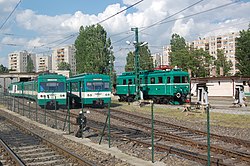HÉV
 |
|||
 |
|||
| Overview | |||
|---|---|---|---|
| Owner | BHÉV Zrt. (public ownership) | ||
| Locale | Budapest metropolitan area, Hungary | ||
| Transit type | Commuter rail/rapid transit | ||
| Number of lines | 4 (+1 side line) | ||
| Number of stations | 81 | ||
| Operation | |||
| Operator(s) | BHÉV Zrt. | ||
| Technical | |||
| System length | 103.7 km | ||
| Track gauge | 1,435 mm (4 ft 8 1⁄2 in) | ||
|
|||
BHÉV (Budapest Helyiérdekű Vasút, "Budapest Railway of Local Interest") is a system of four commuter rail lines (Szentendre HÉV, Gödöllő HÉV, Csömör HÉV and Ráckeve HÉV) and rapid transit (Csepel HÉV and Békásmegyer HÉV (part of the Szentendre HÉV)) lines in and around Budapest, Hungary. The BHÉV operates on standard gauge (1,435 mm (4 ft 8 1⁄2 in) ), and is electrified at 1000 V DC.
The BHÉV lines were constructed as branch lines of the Hungarian State Railways. Helyiérdekű vasút (HÉV), literally "railway of local interest", is a general term in Hungarian traffic. Therefore, like internationally with the term metro, the stations are only marked with H or HÉV, though this is not the full name of the system. The four BHÉV lines are operated by the public transport company BHÉV Zrt., yet are not part of the Budapest Metro. Inside Budapest, standard BKK tickets and passes are valid on the BHÉV. Outside Budapest, a separate ticket must be validated.
The BHÉV connects Csepel (south), Ráckeve (far south), Gödöllő (northeast), and Szentendre (north) with various points of central Budapest. The four BHÉV lines are not connected directly, each originating from a different terminus, but their railway are still connected to the MÁV lines. The BHÉV is a hybrid between a commuter rail and a rapid transit. Although most of its stations are above ground and outdoor, some are underground (for example the city centre terminus at Batthyány tér).
...
Wikipedia

